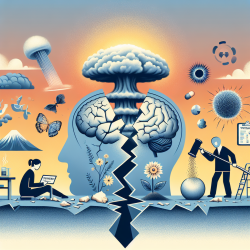The 2011 Great East Japan Earthquake was a catastrophic event that left deep scars on the Japanese landscape and its people. Beyond the physical devastation, this disaster had profound mental health impacts that continue to affect survivors today. As a practitioner, understanding these impacts is crucial for providing effective support and therapy to those affected by similar disasters.
A Complex Disaster with Far-Reaching Effects
The earthquake triggered a tsunami and a nuclear accident at the Fukushima Daiichi Nuclear Power Plant. This compound disaster resulted in significant psychological distress among survivors. According to a systematic literature review conducted by Harada et al., many individuals experienced posttraumatic stress disorder (PTSD), depression, anxiety, and physical health changes such as sleep disturbances.
Key Findings from the Research
- A substantial number of affected individuals showed considerable psychological distress.
- Mothers of young children and nuclear plant workers in Fukushima faced immense fear and uncertainty due to radioactive exposure.
- Stigma and discrimination were additional challenges for Fukushima residents.
- Vulnerable groups included disaster workers, children, internally displaced people, patients with psychiatric disorders, and the bereaved.
Implications for Practitioners
Practitioners can leverage these findings to improve their therapeutic approaches. Here are some strategies:
- Focus on Vulnerable Groups: Tailor interventions to address the specific needs of vulnerable populations such as children and disaster workers.
- Address Stigma: Develop programs that combat stigma and promote community acceptance for those affected by radiation exposure.
- Enhance Resilience: Implement resilience-building activities that help individuals cope with fear and uncertainty.
- Long-Term Support: Provide ongoing support to address long-term mental health issues that may arise years after the disaster.
Encouraging Further Research
The research highlights the need for continuous study into the long-term mental health effects of such disasters. Practitioners are encouraged to engage in further research to develop more effective therapeutic interventions. Understanding the complex interplay between physical and psychological impacts can lead to better support systems for future disaster scenarios.
If you're interested in delving deeper into this topic, I highly recommend reading the original research paper titled Mental health and psychological impacts from the 2011 Great East Japan Earthquake Disaster: a systematic literature review.










